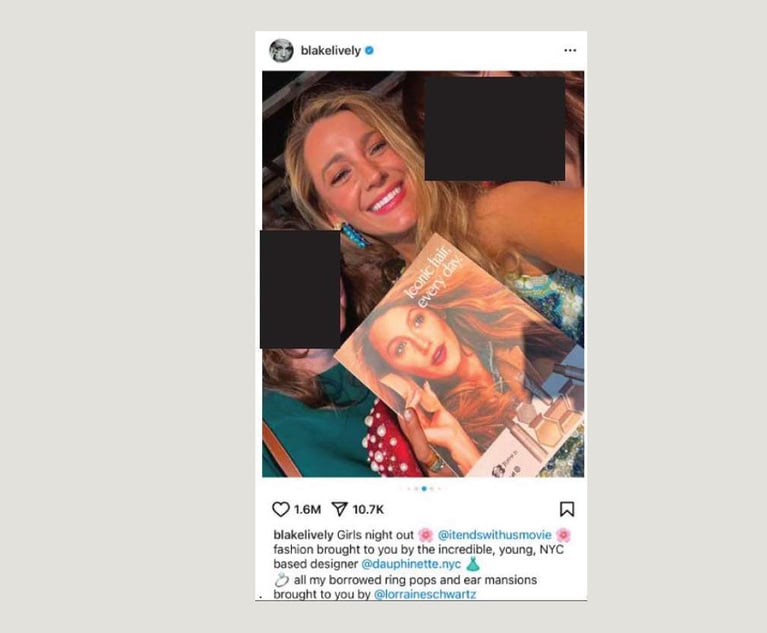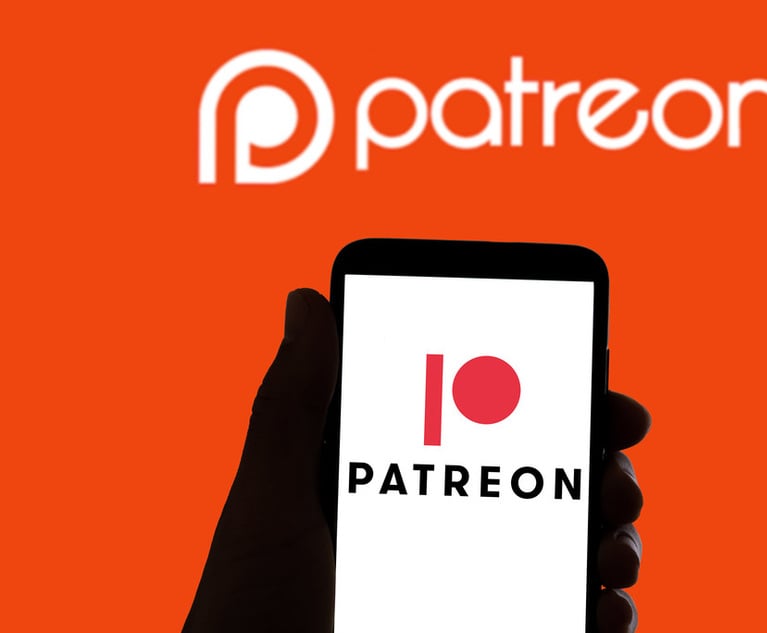9th Circuit: No Music in the Courtroom for Led Zeppelin Hearing
Eleven Ninth Circuit judges will hear a lot of arguments about copyrights Monday in the dispute over "Stairway to Heaven." But they'll do it without musical accompaniment.
September 20, 2019 at 09:58 AM
4 minute read
 Robert Plant, left, and Jimmy Page of Led Zeppelin in concert in Chicago, Illinois. in 1977. (Photo by Jim Summaria via Wikipedia.)
Robert Plant, left, and Jimmy Page of Led Zeppelin in concert in Chicago, Illinois. in 1977. (Photo by Jim Summaria via Wikipedia.)The Ninth Circuit is set to hear en banc arguments Monday on a case that could set broad new law on the copyrightability of musical works.
Seventies super group Led Zeppelin and its music labels will square off before the en banc court with the estate of a musician that claims the band copied his song. They'll hash out whether the selection and arrangement of a limited number of musical notes can be copyrighted, and, if so, how much protection such a composition is due. The U.S. government is also chiming in, cautioning the court against "granting a monopoly on a common musical convention."
They're also looking for a definitive ruling on whether sheet music deposited with the Copyright Office or the actual recordings of songs define the scope of copyright protection for pre-1978 musical works. A lawyer for the estate of musician Randy Wolfe says that if he can play Wolfe's 1967 song "Taurus" for a jury, his case against Led Zeppelin would be a slam dunk.
The estate has already lost one minor skirmish before the en banc panel. The court on Tuesday turned down attorney Francis Malofiy's request to play portions of " Taurus" and "Stairway to Heaven" for the judges at Monday's argument on his cellphone. He told the court it would prove that "the two songs are, in fact, virtually identical."
Jurors found in 2016 that the two songs are not substantially similar, but a Ninth Circuit panel last year ordered a new trial. U.S. District Judge R. Gary Klausner had instructed jurors that "common musical elements, such as descending chromatic scales, arpeggios or short sequences of three notes" are not protected by copyright. They should have been told that even a limited number of notes can be copyrighted if selected and arranged in an original way, the panel held.
The panel also backed Klausner's decision not to play a recording of "Taurus" for the jury, on the ground that it's the sheet music deposited with the Copyright Office that defines the scope of copyright under the 1909 Copyright Act. (That law has since been superseded by the Copyright Act of 1976.)
The Department of Justice and Copyright Office weighed in on the case last month, arguing that the selection and arrangement of unprotectable musical elements should be entitled to only "thin" copyright protection. That means only "virtually identical" copying would infringe. Skidmore v. Led Zeppelin can't meet that standard because the notes and the rhythm of the two songs "are not all, or even mostly, the same," the government says. Daniel Tenny of the DOJ Civil Division's appellate staff will present amicus argument for the government Monday.
The government's position led to another round of briefing from the parties in the run-up to the argument. Malofiy, of Pennsylvania's Francis Malofiy Esquire, wrote that "the Trump Administration's" amicus brief is "an embarrassment that fails to understand the applicable law or the history of copyright."
He accuses the government of taking up the music industry's "cause du jour" with the thin-protection argument. Thin copyright might apply to "functional, fact-driven" works. But "artistic works with endless variations, such as songs, by their nature are afforded broad protection, not 'thin' copyright," Malofiy argues.
Representing Led Zeppelin and the music labels, Davis Wright Tremaine partner Peter Anderson argues that the estate didn't make a selection-and-arrangement argument at trial. But if the en banc court endorses that theory for musical works, it must emphasize that the unprotected elements have to be "sufficiently numerous," combined in a sufficiently original way, and be virtually identical in order to infringe, he says.
He wants the court to disclaim language from recent decisions, such as a 2018 case involving Pharrell Williams and Robin Thicke's "Blurred Lines," that he says makes it too easy for plaintiffs to "cherry-pick" snippets of allegedly infringing works.
Chief Judge Sidney Thomas will hear argument Monday along with Judges Susan Graber, M. Margaret McKeown, William Fletcher, Carlos Bea, Sandra Ikuta, Mary Murguia, Jacqueline Nguyen, Paul Watford, Andrew Hurwitz and Bridget Bade.
This content has been archived. It is available through our partners, LexisNexis® and Bloomberg Law.
To view this content, please continue to their sites.
Not a Lexis Subscriber?
Subscribe Now
Not a Bloomberg Law Subscriber?
Subscribe Now
NOT FOR REPRINT
© 2025 ALM Global, LLC, All Rights Reserved. Request academic re-use from www.copyright.com. All other uses, submit a request to [email protected]. For more information visit Asset & Logo Licensing.
You Might Like
View All
Netflix Music Guru Becomes First GC of Startup Helping Independent Artists Monetize Catalogs
2 minute read
Justin Baldoni Sues Blake Lively and Ryan Reynolds for $400M in New Step in 'It Ends With Us' Fight
6 minute read
Patreon Hit With Lawsuit for Allegedly Diverting Subscriber Data to Meta

Music App Denied Injunction Against Apple Over Alleged Scheme to Block Its Access to App Store
Trending Stories
- 15th Circuit Considers Challenge to Louisiana's Ten Commandments Law
- 2Crocs Accused of Padding Revenue With Channel-Stuffing HEYDUDE Shoes
- 3E-discovery Practitioners Are Racing to Adapt to Social Media’s Evolving Landscape
- 4The Law Firm Disrupted: For Office Policies, Big Law Has Its Ear to the Market, Not to Trump
- 5FTC Finalizes Child Online Privacy Rule Updates, But Ferguson Eyes Further Changes
Who Got The Work
J. Brugh Lower of Gibbons has entered an appearance for industrial equipment supplier Devco Corporation in a pending trademark infringement lawsuit. The suit, accusing the defendant of selling knock-off Graco products, was filed Dec. 18 in New Jersey District Court by Rivkin Radler on behalf of Graco Inc. and Graco Minnesota. The case, assigned to U.S. District Judge Zahid N. Quraishi, is 3:24-cv-11294, Graco Inc. et al v. Devco Corporation.
Who Got The Work
Rebecca Maller-Stein and Kent A. Yalowitz of Arnold & Porter Kaye Scholer have entered their appearances for Hanaco Venture Capital and its executives, Lior Prosor and David Frankel, in a pending securities lawsuit. The action, filed on Dec. 24 in New York Southern District Court by Zell, Aron & Co. on behalf of Goldeneye Advisors, accuses the defendants of negligently and fraudulently managing the plaintiff's $1 million investment. The case, assigned to U.S. District Judge Vernon S. Broderick, is 1:24-cv-09918, Goldeneye Advisors, LLC v. Hanaco Venture Capital, Ltd. et al.
Who Got The Work
Attorneys from A&O Shearman has stepped in as defense counsel for Toronto-Dominion Bank and other defendants in a pending securities class action. The suit, filed Dec. 11 in New York Southern District Court by Bleichmar Fonti & Auld, accuses the defendants of concealing the bank's 'pervasive' deficiencies in regards to its compliance with the Bank Secrecy Act and the quality of its anti-money laundering controls. The case, assigned to U.S. District Judge Arun Subramanian, is 1:24-cv-09445, Gonzalez v. The Toronto-Dominion Bank et al.
Who Got The Work
Crown Castle International, a Pennsylvania company providing shared communications infrastructure, has turned to Luke D. Wolf of Gordon Rees Scully Mansukhani to fend off a pending breach-of-contract lawsuit. The court action, filed Nov. 25 in Michigan Eastern District Court by Hooper Hathaway PC on behalf of The Town Residences LLC, accuses Crown Castle of failing to transfer approximately $30,000 in utility payments from T-Mobile in breach of a roof-top lease and assignment agreement. The case, assigned to U.S. District Judge Susan K. Declercq, is 2:24-cv-13131, The Town Residences LLC v. T-Mobile US, Inc. et al.
Who Got The Work
Wilfred P. Coronato and Daniel M. Schwartz of McCarter & English have stepped in as defense counsel to Electrolux Home Products Inc. in a pending product liability lawsuit. The court action, filed Nov. 26 in New York Eastern District Court by Poulos Lopiccolo PC and Nagel Rice LLP on behalf of David Stern, alleges that the defendant's refrigerators’ drawers and shelving repeatedly break and fall apart within months after purchase. The case, assigned to U.S. District Judge Joan M. Azrack, is 2:24-cv-08204, Stern v. Electrolux Home Products, Inc.
Featured Firms
Law Offices of Gary Martin Hays & Associates, P.C.
(470) 294-1674
Law Offices of Mark E. Salomone
(857) 444-6468
Smith & Hassler
(713) 739-1250






